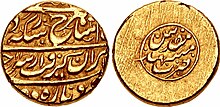Shah Ruch (Afsharide)
Shah Ruch ( Persian شاهرخ, DMG Šāh-Ruḫ , * around 1730; † 1796 ) was the penultimate king from the Afsharid dynasty . He ruled three times between 1748 and 1796, most recently as a puppet for the Afghan Durrani rulers .
Shah Ruch was the son of Reza Gholi Mirza and Fatima Begum and thus a grandson of Nadir Shah ; On his mother's side, he was descended from the Safavids . After defeating his great-uncle Ebrāhim Shah Afshār , who had only recently deposed his own brother Adil Shah , Shah-Ruch became the new Shah in 1749 and made Mashhad the capital of the empire. His fourth son Nadir Mirza became Prince Khorasan .
Shah-Ruch was a contemporary of the Safavid descendant Mir Sayyid Muhammad, who, encouraged by nobles, overthrew him in 1749 and ascended the throne as Sulayman II . Shah Ruch was captured and blinded .
In 1749, a follower of Nadir Shah by the name of Azad Chan Afghan began an independence movement in Tabriz that separated the old Atropatene province from the empire, while to the east of him the Qajars under Mohammad Hassan Khan took over the Mazandaran region . The empire threatened to split even further.
In 1750 Sulayman II himself was captured and blinded by Shah Ruch's supporters. Then the Afsharide was reinstated as a Shah. When Karim Khan took control of the Persian Empire in 1760 , he left Shah-Ruch in power out of respect for his grandfather Nadir Shah, but he only ruled the province of Khorasan. In 1796, Aga Mohammed Khan conquered Khorasan and tortured Shah-Ruch to death in order to gain access to the treasures of Nadir Shah.
| predecessor | Office | successor |
|---|---|---|
| Ebrāhim Shah Afshār | Shah of Persia (1st time) 1748–1749 |
Sulayman II |
| Ebrahim Shah Afshar | Ruler of Azerbaijan (as part of Persia) 1748–1749 |
Azad Khan Afghan |
| Ebrahim Shah Afshar | Ruler of Mazandaran (as part of Persia) 1748–1749 |
Mohammad Hasan Khan Qajar |
| Suleiman III. | Shah of Persia (2nd time) 1750–1760 |
Karim Khan |
| Sulayman II | Ruler of Khorasan 1750–1796 |
Aga Mohammed Khan |
Individual evidence
- ↑ Shiri Ram Bakshi: Advanced History of Medieval India ; 1995, ISBN 81-7488-028-3
| personal data | |
|---|---|
| SURNAME | Shah Ruch |
| ALTERNATIVE NAMES | Shah Ruch; Shah Ruch Shah Afshar |
| BRIEF DESCRIPTION | Persian Shah |
| DATE OF BIRTH | around 1730 |
| DATE OF DEATH | 1796 |
